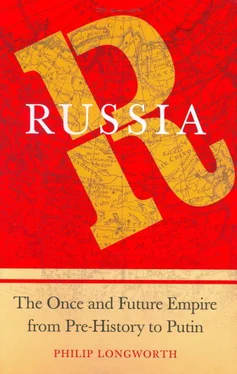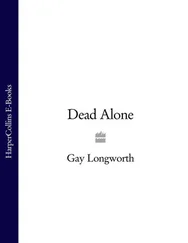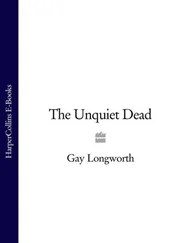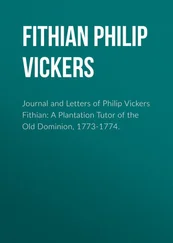The reign of Ivan IV is one of the great climacterics of history. It marks the emergence of an imperial power in fact as well as aspiration, and Ivan justified Russia’s use of the double-headed eagle by ordering expansionist drives southwards into the Caucasus, and westward to the Baltic, launching a third, into Siberia, for good measure. The new imperial status was also supported by a fresh, and violent, effort to make government autocratic in practice as well as in theory, by the emergence of a colonial administrative system, and by the systemization of Russia’s foreign relations.
The hectic period saw a series of other innovations and changes. The first printing press was set up in Moscow; the laws were to some extent reformed and an attempt was made to codify them; new technology was applied to both the army and its armament; and the revolution was capped by institutional developments of lasting importance: the establishment of a system of granting landed estates on condition of service to the state, and of modern, absolutist, practices of government. It is curious, however, that Ivan — who is associated with Russia’s emergence as a great European power — should also be held responsible for its subsequent collapse, and doubly paradoxical that historians should claim that his own actions both undermined the empire he had created and helped to ensure its longer-term recovery However, the crucial changes of his tumultuous reign can hardly be understood without reference to the man himself in all his eccentric brilliance.
Ivan’s image is clouded by controversy He is both an object of hate and a folk hero. Since his own time he has been regarded as an ogre in the West, but his epithet ‘the Terrible’ is a misleading translation of the Russian Groznyi, ‘the Dread’— bestowed by his propagandists for his punishing of wrongdoers — and he is still revered by many of his own people as a truly Christian ruler. One of his successors was to find it necessary to atone posthumously for Ivan’s sins; yet his image was to be resurrected as a morale-booster when Russia was beleaguered during the Second World War.
Furthermore, Ivan’s reputation has been shaped to suit political interests abroad as well as in Russia. Germans, frightened by Ivan’s drive towards the Baltic, used their new printing presses to blacken his image with sensational reports of his atrocities. More than sixty German news-sheets recording Ivan’s outrages, real and alleged, both in Russia and abroad, appeared between 1560 and 1580 alone. They included hair-raising stories of how the Russians not only butchered their enemies, severed people’s limbs, and led thousands away in chains, captive, but also spitted and roasted young girls, impaled babies, and burned old people in their houses. Atrocities were committed — though they were not the monopoly of one side — but exaggerated and invented tales about the Russians were disseminated in a deliberate attempt to enlist the sympathy of the German-speaking world and the help of the Habsburg Emperor. The Polish government and Counter-Reformation publicists added their voices to the anti-Ivan chorus (although the papacy, still hoping to bring the Orthodox Churches within its fold, and interested in Russia as a possible route to China, held its fire). So the notion was propagated that Russians were savage heretics and their tsar a classic tyrant. It was the foundation of a tradition which was to inspire President Reagan’s definition of the Soviet Union as an ‘evil empire’. 2
During the Cold War, Western propaganda presented Ivan as the precursor of Stalin: a paranoid imperialist, and creator of a reign of terror. But we should not judge him before the accretions of myth, both for and against him, have been stripped from his image. Nor should he be judged outside the context of his own turbulent and violent times. Ivan was a Renaissance prince and an Orthodox Christian in that confusing and pitiless age of Protestant Reformation and Catholic Counter-Reformation whose attendant wars were also to draw in the Christian Orthodox world to which Ivan and his people belonged. The invention of printing sharpened polemic, and the military revolution forced all monarchs who took their responsibilities seriously to take draconian measures to modernize their realms. Ivan was indeed responsible for terrible massacres, as were his contemporaries. Pizarro and the Spanish conquistadores did not shrink from killing; Lorenzo de’ Medici was ruthless in dispatching his political rivals; Louis XI of France sanctioned the St Bartholomew’s Day massacres; Queen Mary of England condoned the burning of the Oxford martyrs. The blood these rulers shed was as much a measure of the forces they were pitted against as of any sadistic impulses they may have had. Ivan was no less cruel than his peers, but that did not make him an Asiatic despot.
All this said, Ivan presents as a quirky figure. He married seven times -once more than Henry VIII — regardless of the canons of his Church, which permitted no more than three marriages. He quit his own capital in an apparent huff when thwarted, engaged personally in a theological disputation with a Jesuit sent to him by the Pope, had the Metropolitan of the Russian Church done to death, and killed his own eldest son in a fit of rage. In search of the real Ivan, his remains have been disinterred and subjected to scientific tests; there have even been attempts to psychoanalyse him in retrospect. Yet the controversy remains. Was he hero or devil, paranoiac, sadist, or just and concerned ruler? Contemporary historians are divided on the question. 3To get the measure of this man who was both maker and breaker of an empire, we need first to consider his formation and then follow his career as empire-builder in the context that shaped his actions.
Ivan was born in 1530, and succeeded to the throne in 1533, on the death of his father, Vasilii III. A council of regents ruled Russia in his name until he came of age. But the government was unstable, and the period stormy. When his mother, Elena Glinskaia, the central figure of the government, died, allegedly of poison, in 1538, Prince Vasilii Shuiskii took her place; and when Shuiskii died shortly afterwards his brother Ivan took over — only to be was ousted by a rival, Ivan Belskii, who was soon deposed in his turn and executed. Meanwhile successive heads of the Russian Church were ousted and replaced. This traumatizing phase of political instability came to an end when members of Ivan’s mother’s family staged a coup in his favour in 1543. The occasion was his thirteenth birthday, which marked the coming of age for sons of emperors in the Byzantine Empire, and, according to the Nikon Chronicle, Ivan himself gave the order. So the presiding regent, Prince Andrei Shuiskii, was seized and handed over to the palace kennel-men, ‘and the dog-keepers took him and killed him… And from that time the boyars began to fear the sovereign.’ 4
Thus Ivan’s early years were marked by political instability, and possibly personal insecurity too (as Sergei Eisenstein, the famous Soviet film-maker, suggests in his classic but unfinished film treatment of Ivan). It is also said that he grew up wild and violent, but the source was a close friend who became a bitter enemy and cannot be trusted. 5Nor was it as easy for the young ruler to establish his authority as the chronicle makes out. However, we can infer from his own writings and contemporary accounts that Ivan had received an excellent education for his time and station. He was both highly literate and musical, interested in the outside world, and, as befitted a monarch, both a keen huntsman and dutiful in matters of religion. He received instruction from senior officials concerned with legal administration, military and foreign affairs, and, of course, the Church, so that he was well apprised of Muscovite policies and statecraft and knew something about the lands beyond his frontiers.
Читать дальше





![Stephan Orth - Behind Putin's Curtain - Friendships and Misadventures Inside Russia [aka Couchsurfing in Russia]](/books/415210/stephan-orth-behind-putin-s-curtain-friendships-a-thumb.webp)





